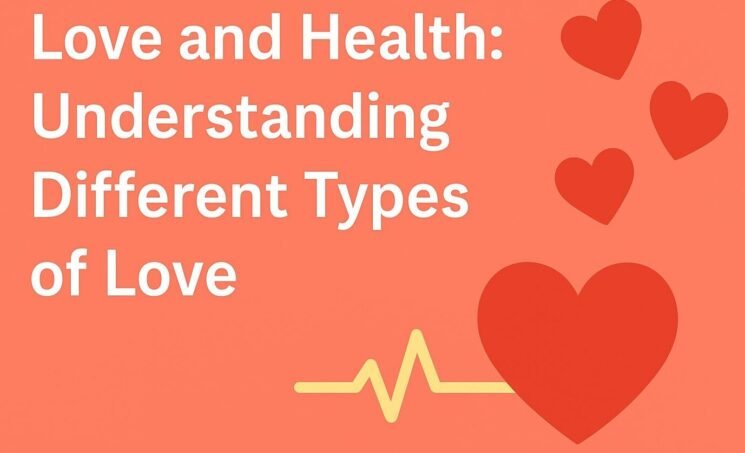Love and Health: Understanding Different Types of Love
Love is one of the most complex and multifaceted human experiences. It encompasses a wide range of emotions, behaviors, and relationships. While we often think of love in terms of romantic relationships, there are actually several distinct types of love that we encounter throughout our lives.
In this blog post, we’ll explore the different types of love and how they manifest in our relationships with others and ourselves.
The Ancient Greek Typology of Love
The ancient Greeks had a deep fascination with love and identified several distinct types. These include:
1. Eros (Romantic Love): This is the passionate, intense love that we often associate with romantic relationships. It is characterized by physical attraction, desire, and infatuation.
2. Philia (Brotherly Love): This is the deep, affectionate love between friends or family members. It is based on mutual respect, understanding, and shared experiences.
3. Storge (Familial Love): This is the natural love between parents and children. It is a deep, unconditional love that is not dependent on reciprocation.
4. Agape (Divine Love): This is the pure, selfless love that is often associated with the divine or with the highest form of human love. It is a love that expects nothing in return and is focused on the well-being of others.
5. Ludus (Playful Love): This is the lighthearted, playful love that is often found in the early stages of a romantic relationship. It is characterized by flirting, teasing, and a sense of fun.
6. Pragma (Enduring Love): This is the practical, long-lasting love that develops over time in a relationship. It is based on mutual understanding, compromise, and a commitment to making the relationship work.
7. Philautia (Self-Love): This is the love that we have for ourselves. It is the foundation for all other types of love, as we cannot truly love others until we love ourselves.
8. Mania (Obsessive Love): This is the unhealthy, obsessive love that can lead to jealousy, possessiveness, and even violence. It is often the result of an imbalance in other types of love.
The Triangular Theory of Love
In addition to the ancient Greek typology, psychologist Robert Sternberg has proposed a triangular theory of love that identifies three key components of love:
1. Intimacy: This is the feeling of closeness, connectedness, and bonding that we experience in a relationship.
2. Passion: This is the physical and emotional attraction that we feel towards our partner.
3. Commitment: This is the decision to stay in a relationship and work through any challenges that arise.
According to Sternberg, the combination of these three components can result in different types of love. For example, a relationship that is high in intimacy and commitment but low in passion may be characterized as companionate love, while a relationship that is high in passion but low in intimacy and commitment may be characterized as infatuated love.
The Five Love Languages
Another influential theory of love is Gary Chapman’s Five Love Languages. According to Chapman, there are five primary ways that people express and experience love:
1. Words of Affirmation: This involves expressing love through words of praise, encouragement, and appreciation.
2. Quality Time: This involves giving someone your undivided attention and making them feel special.
3. Acts of Service: This involves doing things for your partner to make their life easier or more enjoyable.
4. Gifts: This involves giving physical tokens of love and appreciation.
5. Physical Touch: This involves expressing love through physical contact, such as hugging, kissing, or holding hands.
Understanding your own and your partner’s primary love languages can help you communicate your love more effectively and strengthen your relationship.
The Importance of Self-Love
One of the most important types of love is philautia, or self-love. As the ancient Greeks recognized, we cannot truly love others until we love ourselves. Self-love involves accepting ourselves for who we are, treating ourselves with kindness and respect, and prioritizing our own needs and well-being.
When we have a strong foundation of self-love, we are less likely to tolerate unhealthy relationships or to seek validation from others. We are also more likely to attract healthy, loving relationships into our lives.
The Challenges of Love
While love can be a beautiful and rewarding experience, it is not without its challenges. All types of love, from romantic to familial to self-love, can be complicated and messy at times.
One of the biggest challenges of love is navigating the different types of love that we experience in our lives. For example, we may love our partner deeply but struggle with feelings of mania or obsession. Or we may love our family but feel a sense of obligation rather than genuine affection.
Another challenge of love is dealing with the pain and heartbreak that can come with it. Whether it’s the end of a romantic relationship, the loss of a loved one, or the disappointment of unmet expectations, love can be a source of great pain and suffering.
Love is a complex and multifaceted experience that takes many forms throughout our lives. By understanding the different types of love and how they manifest in our relationships, we can navigate the challenges of love more effectively and build stronger, healthier connections with others and ourselves.
Whether it’s the passionate love of Eros, the affectionate love of Philia, or the self-love of Philautia, love is a fundamental part of the human experience. By embracing love in all its forms and learning to love ourselves and others more deeply, we can create a more loving and compassionate world for all.
Unveiling the Cosmos: 12 Zodiac Signs and Astrology’s Influence on Love and Relationships.




